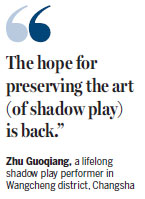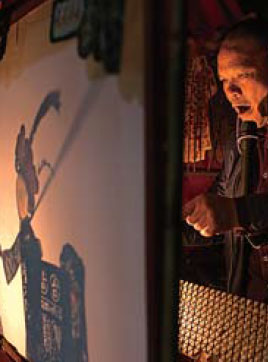Shadow art popularity resurges as in old times
"The shadow play is a great way to educate people about morality and values. If I let the shadow play art of Wangcheng die out in my generation, then I am no better than a criminal!" said Zhu Guoqiang, a lifelong shadow play performer in Wangcheng district, Changsha, capital of Hunan province.
Shadow play, also known as shadow puppetry, is an ancient form of entertainment that uses paper cut-outs or hidden puppets to tell heroic sagas. A good performance requires sophisticated control over both shadow and light, delicately made paper figures, storytelling skills, as well as creative use of various musical instruments.
Wangcheng, a historical town of Changsha, Hunan province, has been known for its shadow plays since the Qing dynasty (1644-1911). Zhu's family has run shadow art troupes for generations. Born in 1962, Zhu entered the line of work when he was 15 years old and later became the fifth successor of this family tradition.

"Back in the day, shadow play was popular. We had work the whole year round," he said. "There was a time I had more than 10,000 people in the audience."
After 30 years in the theater, Zhu is getting better and better at his art. However, challenged by the modern entertainment industry, this traditional folk art has lost its former glory.
There used to be more than 10 shadow art troupes in the town. But most of his peers had to change to other professions, leaving Zhu the last man standing. In order to preserve the art craft, Zhu has spent all his income collecting scripts and making puppets.
"There were collectors who offered me 1.5 million yuan ($217,398) for my collection, but I turned them down," Zhu recalled. "The shadow play is a precious cultural heritage our ancestors left. We cannot throw it away."
Fortunately, the local government has been aware of the decline of this precious treasure and is determined to bring it back to life. In recent years, Wangcheng district has made policies to promote and revitalize Zhu's shadow theater. In 2009, the local government funded him to build a shadow art museum. This year they have helped to install a large screen and set up interactive activities for children.
"The hope for preserving the art is back," said Zhu. "During this year's golden week of national holiday, we had many tourists coming to watch the show. We staged more than 20 shows daily and the theater was packed."
zhuanti@chinadaily.com.cn
|
Zhu Guoqiang, a lifelong shadow play performer, strives to preserve the art form in Changsha. Xiao Yi / For China Daily |
(China Daily 12/03/2016 page10)















